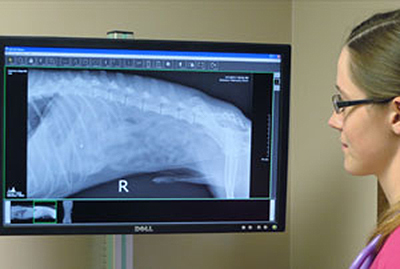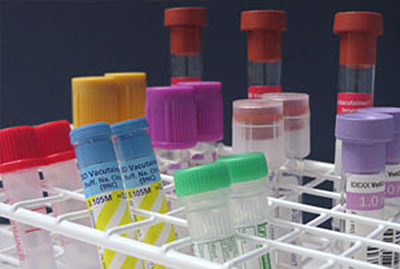At Solomon Veterinary Clinic,
we have an in-house laboratory that allows us to receive results for
most tests within minutes to hours. This includes evaluation of blood
chemistries, electrolytes, complete blood counts, parasite screens and
urinalysis. Not only do we perform parasite screens and bloodwork, but
we are also able to test for infectious diseases like feline leukemia,
FIV and parvovirus. Our laboratory is able to test for complex metabolic
diseases, such as diabetes, thyroid and adrenal gland disorders, as
well as monitor blood levels of certain medications, like phenobarbital.
Having this technology on the premises gives us the ability to gather
valuable diagnostic information within minutes, which in turn allows us
to find and treat a large number of illnesses that may affect your
beloved pets.
In addition to our in-house laboratory, we have a
full reference lab at our disposal. This vastly expands our diagnostic
capabilities, and these results are usually obtained within 24 to 48
hours.

Radiography
is a valuable diagnostic tool in veterinary medicine. As we continually
strive to offer the highest-quality medicine and diagnostic testing, we
are pleased to offer radiology services as a means of providing
excellent care to our patients.
Solomon Veterinary Clinic
uses digital radiography (X-rays), which provides quicker, clearer and
faster images than traditional film X-ray. A digital X-ray is taken and
processed in seconds. Like a digital photo, a digital radiograph can be
enhanced after it is taken, allowing our doctors to highlight the image
in ways that weren't possible with film X-ray.
Radiography is
painless, safe and completely noninvasive, and it uses only very low
doses of radiation. Because the level of radiation exposure needed to
perform radiography is very low, even pregnant females and very young
pets can undergo radiography. Radiographs can be used to evaluate bones
as well as the size, shape and position of many of the body's organs.
The size of organs is important because some medical conditions, such as
kidney, heart or liver disease, can alter the size of these organs. The
shape and position of organs can be altered or distorted by certain
medical conditions, including intestinal blockage or cancer. Tumors,
depending on their size and location, can also sometimes be detected
using radiography. Radiography can also be used to diagnose bladder
stones, broken bones, chronic arthritis, certain diseases of the spine
and a variety of other conditions. Radiographs are an important tool
that can help us make an accurate diagnosis for your pet.
At Solomon Veterinary Clinic,
we use the latest in advanced veterinary diagnostic tools to ensure
that pets receive the highest quality of veterinary care.
Electrocardiography is one of those tools. It is used to monitor a pet's
heart rhythm and electrical impulses, and it can be performed with
rapid results to assist in cardiology cases.
We will use this
tool any time there's a concern about your pet's heart. If your pet is
experiencing coughing, labored breathing, lethargy or weakness, it's
possible that a heart condition could be the underlying cause.
Electrocardiography will help our veterinarians to determine whether
this is the case.
This procedure is noninvasive, and your pet
will not need to be sedated. Your pet will be placed on his or her side
and electrodes will be attached to specific regions along your pet's
body. The resulting electrocardiogram (also known as an EKG or ECG) will
be available for review within minutes.
If your pet does have an
irregular heart rhythm or another cardiac condition, our veterinarians
will work with you to ensure that your pet receives the best in
veterinary cardiology care.
Although
humans and animals are different in many ways, some advances in human
medicine are also very useful in veterinary patients. One of these
advances, endoscopy, has proven to be a powerful diagnostic and
therapeutic tool in veterinary medicine. As a practice, we consider it a
goal to offer state-of-the-art medicine and diagnostic testing, so we
are proud to offer endoscopy as a means of providing a higher level of
quality care to our patients.
Endoscopy allows the
veterinarian to examine and collect biopsy specimens from the stomach,
small intestine and colon. Additionally, endoscopic procedures are
usually noninvasive or minimally invasive. For example, foreign objects
your pet may swallow can frequently be retrieved by endoscopy, making
surgery unnecessary. We strive to offer our patients the highest level
of medicine, and we are glad to be able to offer endoscopy as one of our
diagnostic procedures.
Endoscopy utilizes high-tech fiber
optic technology and enables our veterinarians to perform a direct
visual examination of your pet's gastrointestinal system. In order to
perform the procedure, your pet is anesthetized, and a tube containing a
camera is passed down through the esophagus and into the stomach and
the upper small intestine. Alternatively, the camera can be placed in
the rectum and into the colon. These procedures allow our veterinarians
to view any potential problems in your pet's oral cavity, esophagus,
stomach, colon and upper intestinal tract.
Endoscopy is used
to detect and diagnose a wide range of conditions. These include
infections, inflammatory bowel disease, certain forms of cancer and the
presence of foreign bodies.
When necessary, biopsies can be
taken during the procedure. Should a foreign body be discovered, it may
be possible to remove it at that time.
We are extremely
pleased to be able to provide this service to our pet patients and their
families. Endoscopy enables our veterinarians to accurately diagnose
and treat conditions while avoiding the need for surgery in many cases.
This means less trauma for your pet and a quicker recovery time.
Endoscopy
is just one of the ways our veterinarians and staff are able to provide
state-of-the-art and compassionate veterinary care to the pets we
treat.

